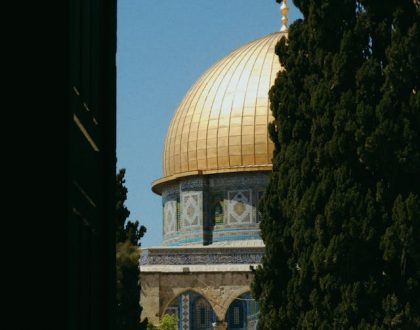Argumentation and questions – Tarawih reflections 3

Tonight we recited the central story of Surat al-Baqarah – the story of the cow, from which the surah takes its name.
The story of the cow
We know from historical narrations that a very rich man from Bani Israil was killed one night by his nephew, who was his only heir. In the morning, his body was found somewhere far away, and the tribe accused the people around that area. A big argument followed, and they decided to go to Musa (peace be upon him) for advice.
Musa told them that Allah had commanded them to sacrifice a cow. That was all: had they listened then, any cow would have sufficed. Instead, they started questioning Musa about what sort of cow it should be.
First, they thought Musa was mocking them. Then they started asking questions about the cow. How old should she be? Allah said, ‘The cow should neither be old nor young but in between’. [2:68]
Then they asked about the colour. It should be a bright yellow cow—pleasant to see. [2:69]
They said, “Call upon your Lord to make clear to us what it is. Indeed, [all] cows look alike to us. And indeed we, if Allah wills, will be guided.” [2:70]
They still weren’t satisfied, and still wanted to know more details. It should have been used neither to till the soil nor water the fields; wholesome and without blemish. [2:71]
By now, the criteria were so specific that there was only one cow that fit them. It belonged to an orphan who had nothing but his cow – see how Allah sent this rizq to him. He was able to negotiate a very high price with Bani Israil.
Whoever rushes something before it’s due time, will be deprived of it
They were told to ‘Strike the dead body with a piece of the cow’ [2:73], and the slain man would rise up and tell them who had killed him. This is exactly what happened, and accordingly his nephew inherited nothing.
This is the same in our shariah: a killer receives nothing from the estate of the one he killed, even if he would have been entitled to inherit from him – such as his parent, or anyone else. There is a fiqhi maxim that whoever rushes something before its time, will be deprived of it. This is the same in Jewish tradition and in Islam.
Avoid arguments
The moral of this story is about argumentation. This is why the Prophet (peace be upon him) ﷺ told his Companions not to ask too many questions about things that were revealed to them. Allah would only reveal what is good for mankind. He hates pointless, useless and hypothetical questions, and especially questions that create hardship by making something become an obligation when it wasn’t one before, by probing and probing.
For example, when the Prophet ﷺ was delivering his speech about Hajj, Al Aqra’ bin Habis interrupted him to ask if it had to be performed every year. He didn’t answer, so the man asked again, and then a third time. Finally, he said, “No. And if I had said yes, it would have become obligatory and you would not have been able to do it.” [Muslim].
Abu ‘Isa Al-Mughirah bin Shu’bah (May Allah be pleased with him) reported:
The Prophet ﷺ said,
Allah dislikes idle talk, to ask too many questions (for things which will be of no benefit to one), and to waste your wealth”.
[Bukhari and Muslim]
Abu Huraira (may Allah be pleased with him) narrated that the Prophet ﷺ said,
“Leave me as I leave you, for the people who were before you were ruined because of their questions and their differences over their prophets. So, if I forbid you to do something, then keep away from it. And if I order you to do something, then do of it as much as you can.” [Bukhari and Muslim]
Anas ibn Malik reported that the Messenger of Allah (peace be upon him) used to say:
“Do not be hard upon yourselves, lest Allah be hard upon you. Indeed, a people were hard upon themselves, so Allah was hard upon them.”
[Abu Dawoud]
Prophetic questioning
Prophet Muhammad ﷺ was the best educator, and he often taught his community by asking them a question and waiting for their response. He wasn’t against asking questions and being inquisitive and curious. But one should ask the right question, with the right etiquette.
Some teachers and circles do not allow questions. This is wrong. It is part of parrot education, to rote learn, rather than challenge students and ask them to think rather. This wasn’t the Prophet’s ﷺ way of teaching.
For example, he once asked, “If there was a river at the door of anyone of you and he took a bath in it five times a day, would you notice any dirt on him?” Then he said that this washing was a metaphor for the five daily prayers which wash away our sins. [Bukhari]. He asked people to use their minds and imaginations.
Going back to the story of the cow, we see throughout Surat al-Baqarah the argumentative streak and rebellious nature of Bani Israil, and disobedience to Allah and his Messenger. We see their sense of the superiority over others.
We ask Allah to enable us to be humble and obedient people who ask questions for the sake of learning, not argumentation.
Ramadan Reminder Night 3
Shaykh Haytham Tamim
Transcribed by Hana Khan
Related posts:
Don’t be the one who has to win every argument
Ghazali on gossips and arguments
The famous argument – Khawla bin Thabit
- The forces of Allah and the fate of the falsifiers
- Climbing the stairs: How to continue your spiritual journey post-Ramadan
- How Allah strengthens the hearts of believers
- Why should you follow up one good action with another one?
- Don’t be a Ramadani person – Be a Rabbani person.
Recommended Posts

The forces of Allah and the fate of the falsifiers
April 26, 2024

How Allah strengthens the hearts of believers
April 19, 2024

